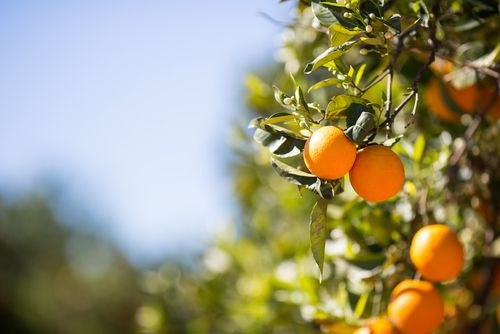Florida Orange Trees Threatened By Citrus Psyllid, Asian Bugs Carrying Bacteria

Orange trees burning down to the ground in Florida is the newest and most recently concerning sight for the $9 billion industry, as farmers attempt to control the spread of a disease. They’re infected by the Asian bug citrus psyllid, which carries with it a bacterium that infects the fruits and feeds on citrus tree leaves, and has many farmers worried for the health of their crop and, ultimately, the cost they must incur to fight off the disease-ridden bugs.
It has farmers worried, such as Ellis Hunt Jr., whose family owns more than 5,000 acres of orange groves and contributes to Florida’s Natural orange juice through a co-op agreement. He estimates he’s spending approximately $2,000 per acre, which is 100 percent more than he was spending 10 years ago. Most of the production costs go into treating and controling the psyllid's spread. "It feels like you're in a war," Hunt told The Associated Press. “We can't let this thing go down on our watch.”
Once the insects spread to a tree, it continues to produce oranges until the disease laces its way through the tree’s vascular system. Then the fruit falls and the tree slowly begins to die. The bug originated from China where they call it huanglongbing, meaning “the yellow dragon disease.” However, it’s known as “greening” in Florida, and the invasion and disease spread has no cure.
The bug arrived first in southern California from Mexico in 2008 due to the spread of disease throughout Mexico from China. There is a belief that the psyllid bug and the disease it carried with it was already living in backyard Florida citrus trees for several years, but the Asian citrus psyllid brought the disease into commercial citrus orchards and wreaked havoc. The only defense line the Florida citrus farmers have is using broad-spectrum pesticides eight times a year to reduce the spread of the bugs and disease. An adult psyllid, however, can transmit the disease faster than most pesticides can kill it, according to the University of California Agriculture & Natural Resources.
"This affects the whole state-- the economic impact the landscape, the iconic image of Florida and how it has drawn people here to smell the orange blossoms in the spring and look forward to that Christmas gift of fresh Florida citrus," Florida State Agriculture Commissioner Adam Putnam, told the Associated Press. Putnam’s family has been growing oranges since the early 1900s. "It will have a ripple effect throughout the economy if we can't get our arms around this disease."
Without a cure for the spread of disease in sight, the Florida orange industry still battles with falling orange juice sales, which dropped the lowest it has ever been in the past 12 years, and experts believe the cause is a combination of increased foreign competition and the health-conscious low-sugar low-carb dieters in the U.S. The world’s top citrus researchers throughout the U.S., China, Brazil, and India are looking into different solutions and treatment approaches, however experts say if a solution isn’t found soon Florida’s 75,000 job-supplying citrus industry could collapse.
Published by Medicaldaily.com



























